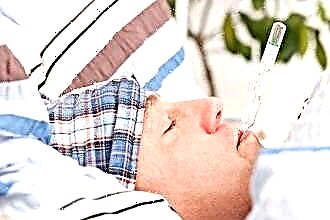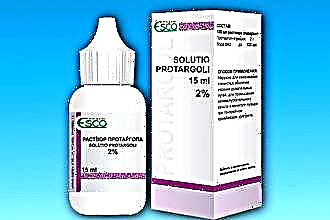Nasal congestion during pregnancy can be both a consequence of hormonal fluctuations and a symptom of the disease. How to understand this, and how to be treated?
Causes
 There are many causes of nasal congestion during pregnancy. We can conditionally divide them into microbial, physiological and non-infectious.
There are many causes of nasal congestion during pregnancy. We can conditionally divide them into microbial, physiological and non-infectious.
Note that many systems in a woman's body have to be rebuilt, which is necessary for the full development of the fetus. The first changes occur in the immune and hormonal system in a pregnant woman. Pregnant women need to create the most comfortable conditions for the embryo, so the immune system is in a depressed state, which allows you to maintain pregnancy and prevent rejection of the fetus.
Against the background of temporary immunodeficiency, the body of the future mother becomes more vulnerable to infectious and environmental factors, which can very often suffer.
Infectious causes
Nasal congestion during early pregnancy can result from:
- colds. After general hypothermia (in the rain, in strong winds, frost, draft), the nasal mucosa loses its protective properties, which is why it is easily infected with pathogenic microorganisms. Rhinitis can be caused by adeno-, corona-, rhinoviruses, MS infection, influenza viruses, parainfluenza;
- exacerbation of chronic sinusitis. If a woman is diagnosed with chronic sinusitis or frontal sinusitis, an exacerbation of the disease can be observed against the background of a slight suppression of the immune defense, which occurs during pregnancy.
Physiological causes
Constant nasal congestion during pregnancy can be troubling due to fluctuations in hormones in the blood. Against the background of a quantitative change in hormones, the blood vessels of the nasopharynx can expand, thereby increasing the likelihood of swelling. As a result, the mucous membrane of the nasal passages swells, and rhinorrhea begins.
As soon as the nose is blocked and breathing becomes difficult, the body may experience a lack of oxygen.
Hormonal rhinitis begins in the second trimester of pregnancy and continues until the postpartum period.
Note that as the size of the fetus increases, the diaphragm rises, making it harder for a woman to breathe. In the later stages, breathing is more frequent and shallow. Often, a pregnant woman has shortness of breath, which is aggravated by difficulty breathing through the nose.
Non-infectious causes
Nasal congestion in early pregnancy can result from:
- contact with an allergic factor. Pollen, wool, dust mites, certain foods, medicines, cosmetics, household chemicals, perfumes or mold can act as a provocateur. While the allergen is acting on the body, the nose will constantly block;
- living in poor environmental conditions. If a woman lives near an industrial area, major highways, she inhales air polluted with chemicals, combustion products, dust. In addition, dry air in the house can aggravate the situation. Irritation of the nasal mucosa is accompanied by its swelling and shortness of breath;
- long-term use of drugs that affect the tone of the blood vessels. If a woman before pregnancy took large doses of antihypertensive drugs, antidepressants, and also abused nasal drops with vasoconstrictor properties, the vessels of the nasopharynx can expand in response to the irritating effect of environmental factors.
Often, a runny nose and nasal congestion during pregnancy are observed in the presence of polyps, a deformed septum, narrow nasal passages, as well as concomitant diseases of the nervous system.
Clinical signs
Nasal congestion in pregnant women can be a manifestation of a cold or allergy, which requires careful differential diagnosis. The therapeutic tactics and, accordingly, the success in treatment depend on the diagnosis.
To quickly facilitate breathing and ensure the full delivery of oxygen to the fetus, it is necessary to use only drugs approved during pregnancy.
Symptomatically, diseases are manifested:
 rhinorrhea. The amount of mucous discharge depends on the cause of the disease. With allergies, they are watery, transparent and abundant. In the case of an infectious rhinitis, the mucous discharge may become thicker and yellow. If a stuffy nose is due to an exacerbation of chronic sinusitis, the snot may be green, scanty and thick;
rhinorrhea. The amount of mucous discharge depends on the cause of the disease. With allergies, they are watery, transparent and abundant. In the case of an infectious rhinitis, the mucous discharge may become thicker and yellow. If a stuffy nose is due to an exacerbation of chronic sinusitis, the snot may be green, scanty and thick;- difficult nasal breathing;
- nasal congestion;
- signs of conjunctivitis (lacrimation, conjunctival hyperemia, itchy eyes), which can be observed with allergies and viral rhinitis;
- hyperthermia. Fever is more pronounced with bacterial inflammation, while with allergies, the temperature is often normal;
- aching joints, muscles;
- malaise;
- decreased appetite;
- sleep disturbance;
- sneezing;
- nasalness;
- deterioration of smell;
- irritability.
Danger to the fetus
The embryo needs a constant supply of oxygen and nutrients. When a woman's nose does not breathe, the internal organs experience hypoxia, especially at night, when breathing can become irregular, with periods of apnea.
When organs are laid, in particular, in the 1st trimester, even a slight oxygen deficiency can lead to impaired embryogenesis and developmental abnormalities.
In addition, there is a risk:
- the occurrence of pathology of the placenta;
- spontaneous abortion, especially in the first trimester;
- premature birth;
- infection of the embryo.
Therapeutic tactics
The main directions of therapy:
- restoration of normal nasal breathing;
- prevention of damage to the placenta and fetus.
Medicines
Only a doctor can prescribe effective remedies without harming the embryo, taking into account the severity of the woman's condition, the timing of pregnancy, as well as the nature of the disease.
Vasoconstrictor drugs
Nowadays, the most popular drugs for the common cold are nasal drops with a vasoconstrictor property. We emphasize that not all medicines of this group are allowed during pregnancy. The therapeutic effect is to reduce the diameter of blood vessels at the injection site, which is accompanied by a decrease in swelling and rhinorrhea.
If your nose is very stuffy during pregnancy, you can use:
- Xymelin, Tizin are very effective agents, however, they are allowed only for single use;
- Vibrocil - allowed in small doses, short-term course;
- Nazivin 0.01%, as well as other drugs recommended for babies.
Vasoconstrictor drugs are used only if the pregnant woman has severe congestion, as well as if there is a threat of complications.
Homeopathic and herbal medicines
Herbal and homeopathic remedies have minimal side effects. Let's describe a few of them in more detail:
- Delufen - has anti-inflammatory, antimicrobial, antihistamine, anti-edema effect, and also accelerates regeneration processes.The therapeutic effect is due to a decrease in the sensitivity of the nasopharyngeal mucosa to irritating factors, for example, smoke, wool, household dust. In addition, the drug reduces the risk of a purulent process, regulates the secretory function, thereby facilitating nasal breathing, clearing the passages of mucus and moisturizing the mucous membrane. The spray kills germs in the nasal passages, strengthens local immune defenses. Delufen can be used for a long time for nasal congestion, which is not accompanied by addiction. Its use is limited to thyroid dysfunction and hypersensitivity. Side effects are isolated only theoretically. They consist in increased salivation and rhinorrhea. It is recommended to use Delufen two injections three times a day. Please note that with prolonged storage of the drug, the solution may become cloudy, which is due to the herbal composition;

- Pinosol is a representative of herbal medicines, which includes pine, mint, eucalyptus oil, vitamin E, and thyme oil. The medicine should not be used for viral, allergic rhinitis, as it is absolutely ineffective. The drug has antibacterial properties, moisturizes the mucous membrane, reduces inflammation, rhinorrhea, strengthens the immune defense, activates regenerative processes and improves local blood circulation. Due to the gradual narrowing of the blood vessels, addiction does not develop. Pinosol does not have a pathological effect on the embryo, therefore it can be used for nasal congestion even in the first trimester. If you are allergic to the components of the drug, bronchospasm, Quincke's edema, urticaria may occur.
It is worth noting that Pinosol can be used for inhalation using a nebulizer. In four milliliters of saline, 50 drops of the drug should be dissolved, after which the vapors should be inhaled through the nose for 5 minutes. Inhalation is not carried out with hyperthermia.
Saline solutions
Aqua Maris, Marimer, Humer are absolutely harmless salt preparations that can be used from the first days of pregnancy. TO
When the nose is blocked during pregnancy, it is recommended to cleanse the nasal passages with a saline solution before putting the medicine into the nasal passages. Remember that it is strictly not recommended to inject the solution under pressure from a syringe, syringe, and also to draw it in by force.
Breathing exercises
When the first signs of nasal congestion appear during pregnancy, breathing exercises are recommended. It allows you to reduce tissue swelling and facilitate nasal breathing. It should be carried out in a park area or room after ventilation, providing sufficient oxygen supply. The duration of the gymnastics is 10 minutes. First, you need to close the left nostril and slowly inhale air through the right. Then you should exhale through both nasal passages. You need to repeat several times, alternately closing one nostril.
Massage
You can cure a stuffy nose with massage. With smooth movements, you need to massage the point between the eyebrows, above the upper lip (in the middle) and near the wings of the nose.
As for folk remedies, it is better to be careful with them so as not to harm either yourself or the unborn child.

 rhinorrhea. The amount of mucous discharge depends on the cause of the disease. With allergies, they are watery, transparent and abundant. In the case of an infectious rhinitis, the mucous discharge may become thicker and yellow. If a stuffy nose is due to an exacerbation of chronic sinusitis, the snot may be green, scanty and thick;
rhinorrhea. The amount of mucous discharge depends on the cause of the disease. With allergies, they are watery, transparent and abundant. In the case of an infectious rhinitis, the mucous discharge may become thicker and yellow. If a stuffy nose is due to an exacerbation of chronic sinusitis, the snot may be green, scanty and thick;

